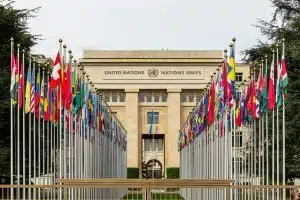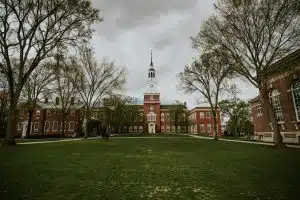No extracurricular activity is “bad,” but some definitely catch the eye of college admissions teams more than others. What really stands out are the activities that are less common and show how deeply committed or successful you are in your chosen pursuit. For example, Tier 1 extracurriculars—those that showcase extraordinary achievement or leadership—tend to carry the most weight because they’re so rare.
Selective colleges take a holistic approach to admissions, meaning they look at the whole picture instead of just focusing on your grades and test scores. Getting involved in extracurricular activities can seriously boost your chances of getting into college. In fact, 96% of admissions officers say they view extracurriculars as a significant or moderately important factor when making decisions.
In this blog, we break down the four tiers of extracurricular activities with examples and discuss whether focusing on Tier 1 activities is essential.
- 4 Tiers of Extracurricular Activities
- Do Tier 1 Extracurriculars Guarantee You a Spot?
- Frequently Asked Questions
- Takeaways
4 Tiers of Extracurricular Activities
Forget the idea that you need a mile-long list of activities to impress selective colleges. What really matters is quality over quantity. Colleges want to see that you’ve stuck with a few key interests, diving deep into your passions and making a real impact. Showing leadership, taking initiative, and staying committed are what stand out the most.
To make sense of it all, admissions teams often sort extracurricular activities into four tiers based on how rare, significant, and involved they are. Here’s a quick look at how this tiered system works:
Tier 1 Extracurriculars
Tier 1 activities are the rarest of the rare, and they show off your exceptional accomplishments or leadership skills. It’s the combination of your standout achievements and how uncommon these pursuits are that really grabs an admissions officer’s attention. Any type of activity can land in Tier 1—it’s your level of success that determines its overall value to colleges.
Tier 1 extracurriculars can span a range of standout achievements. For instance, if you’re a highly recruited basketball player or a nationally ranked tennis star, that’s definitely Tier 1 territory. The same goes for earning national recognition in music—like winning a Jack Kent Cooke Young Artist Award.
Plus, if you’ve snagged first place at the United States of America Mathematical Olympiad (USAMO), qualified for the International Biology Competition (IBO), or won a Regeneron ISEF Award, you’re also sitting firmly at Tier 1.
Here are other Tier 1 extracurriculars examples:
1. Research initiative
Consider launching an ambitious research project in a field you’re passionate about. Imagine developing an AI tool that helps doctors make more accurate diagnoses or using local water data to shape better environmental policies. Maybe you’d like to study how inequality affects school performance or dig through historical archives to reveal hidden Civil Rights stories.
Team up with professors, experts, or organizations to launch a bold research project. You’ll tackle big questions, uncover fresh insights, and create real solutions to real-world challenges—aiming for thorough, high-impact work that pushes your field forward.
2. Policy advocacy campaign
Think about leading a policy advocacy campaign that tackles systemic injustices, promotes human rights, or drives social progress. Maybe you’ll focus on criminal justice reform, gender equality, or environmental protection legislation. Whatever cause you choose, make sure your campaign is well-researched, strategically executed, and clearly influences policy outcomes.
3. Social impact startup
You might create a social enterprise or nonprofit to tackle a pressing social or environmental challenge. Maybe you’ll supply clean water to underserved communities, champion sustainability through innovative tech, or work to close the education gap. Make sure your startup has a strong mission, a solid business model, and real, measurable impact.
4. Educational initiative
Consider launching an educational project that expands access to quality learning and encourages lifelong growth. You could create an online platform full of free resources, hold workshops to teach essential skills in underserved communities, or start a mentorship program for aspiring students.
Remember this:
While winning big competitions or getting into exclusive summer programs is the most common way to land Tier 1 extracurriculars, it’s not your only path. Admissions officers really focus on how much effort you put into your pursuits and the impact you end up making.
That said, here are 10 prestigious high school competitions that often qualify as Tier 1 extracurriculars—meaning they’re highly competitive, nationally or internationally recognized, and showcase standout achievement:
- Regeneron Science Talent Search (STS). Formerly known as the Intel STS, this is one of the oldest and most prestigious science competitions in the United States.
- International Science and Engineering Fair (ISEF). A global competition that attracts top high school researchers from around the world to present their original science projects.
- USA Mathematical Olympiad (USAMO). Part of the American Mathematics Competitions pathway (AMC → AIME → USAMO), leading to the selection of the U.S. team for the International Mathematical Olympiad.
- International Mathematical Olympiad (IMO). The pinnacle of global high school math competitions, featuring the top problem solvers from each participating nation.
- USA Physics Olympiad (USAPhO). A rigorous set of exams that select students to represent the U.S. at the International Physics Olympiad.
- International Physics Olympiad (IPhO). An international competition where the world’s best high school physics students compete in both theoretical and experimental exams.
- USA Biology Olympiad (USABO). A multi-stage competition where top students advance for a shot at representing the U.S. at the International Biology Olympiad.
- International Biology Olympiad (IBO). A prestigious event that tests students on advanced biology topics through lab work and theory exams.
- USA Computing Olympiad (USACO). A coding competition series that narrows down to a final group, with the top performers joining the team for the International Olympiad in Informatics.
- Google Science Fair. A global online science competition open to students around the world, often featuring cutting-edge research projects and significant media attention.
Tier 2 Extracurriculars
Tier 2 extracurriculars show you’ve achieved a high level of leadership and accomplishment, and they still look great on your profile. The only difference from Tier 1 extracurriculars is that Tier 2 activities are a bit more common, which means they’re slightly less influential when it comes to college admissions.
Tier 2 activities include things like being president or chair of a well-known club, such as Model UN, the debate team, or Science Olympiad. Taking on a leadership role shows colleges that you’re not just involved—you’re fully committed and actively shaping the direction and success of the organization.
Here are other Tier 2 extracurriculars examples:
- Academic competitions. Competing in events like science fairs, math contests, debate tournaments, or Model United Nations shows off your brainpower, critical thinking, and ability to handle pressure.
- Global engagement. Activities like studying abroad, joining cultural exchange programs, or volunteering on international projects highlight your global awareness, adaptability, and ability to connect across cultures.
- Special talents or achievements. Unique accomplishments like winning national awards, publishing a book, or excelling in a niche skill (like performing at a professional level) make you stand out and show exceptional dedication.
- Athletic or artistic achievements. Making an all-state team in football, band, or orchestra shows your talent and hard work. Similarly, excelling in regional competitions, like the Junior Science and Humanities Symposium (JSHS), highlights your dedication.
- Self-driven creative projects. Creating a short film that wins a regional award or being a finalist in prestigious contests like the National Youth Poet Laureate competition showcases your creativity and ambition.
- Impactful volunteer work. Volunteering that gains regional or statewide recognition—like developing a program to welcome refugees into your community and earning praise in the media—proves your ability to make a difference.
Tier 3 Extracurriculars
Tier 3 extracurriculars might not have the prestige of Tier 1 extracurriculars, but they still show your involvement outside the classroom and help colleges get a fuller picture of who you are.
For example, holding a minor leadership role—like treasurer or secretary—in clubs such as Model UN, the debate team, or Science Olympiad falls into this category. These roles show leadership and dedication, which colleges value, but they don’t carry as much weight as higher positions like president or captain.
While not as impactful as Tier 1 or 2 activities, Tier 3 extracurriculars are still a great way to highlight your commitment and ability to contribute to a team. Here are other Tier 3 extracurriculars examples:
- Athletic distinctions. If you’re an athlete who didn’t make an all-state team but earned awards like Player of the Week, this showcases your effort and dedication to your sport.
- Regional musical achievements. Musicians selected for a competitive regional ensemble (but not an all-state group) can highlight their talent and commitment to their craft.
- Small-scale volunteer work. Acts like getting groceries for an elderly neighbor or mentoring a younger student show your initiative and willingness to make a difference, even on a smaller scale.
- Internships and research. Gaining hands-on experience through internships or research projects in your field of interest demonstrates your eagerness to learn and explore your future career path.
- Arts and creative projects. Whether it’s performing in music or theater, creating visual art, or writing, these pursuits show your ability to think critically, solve problems creatively, and express yourself.
- Entrepreneurship and innovation. Starting a small business or participating in entrepreneurship competitions showcases your creativity, resilience, and business skills.
- Debate and public speaking. Being involved in debate clubs or public speaking events highlights your ability to communicate clearly, defend your ideas, and handle pressure.
- Leadership positions. Holding leadership roles in school clubs or varsity sports, like being Student Body President or mentoring younger students, shows responsibility and leadership potential.
Tier 4 Extracurriculars
Tier 4 extracurriculars are the most common ones admissions officers see. While they don’t carry as much weight as higher-tier activities, they’re still important because they help colleges get a sense of who you are beyond your grades and test scores.
Take a look at these Tier 4 extracurriculars examples:
- Club membership. Being a general member of clubs like Model UN, debate team, or Science Olympiad shows your interest in engaging with academic or extracurricular communities, even without a leadership role.
- Sports participation. Joining a sports team—like running track or practicing karate for several years—shows your dedication, discipline, and ability to work as part of a team.
- Music and performing arts. Playing in the marching band, learning piano outside of school, or participating in similar activities highlights your creativity and commitment to personal growth.
- Volunteering and community service. Consistently volunteering at places like a food bank or senior center shows your desire to give back and make a positive impact in your community.
- Cultural and hobby clubs. Joining a cultural club, academic society, or a group based on your hobbies gives you a chance to connect with like-minded peers while pursuing something you enjoy.
Do Tier 1 Extracurriculars Guarantee You a Spot?
Having Tier 1 extracurriculars can significantly boost your chances of getting into a top college, but they don’t guarantee you a spot.
Admissions officers at selective schools look at applications holistically, which means they’re considering more than just your accomplishments. Your grades, test scores, essays, recommendation letters, and personal story all play a role in their decision.
While Tier 1 extracurriculars—like winning a national competition, founding a successful nonprofit, or representing your country in an international event—makes your application stand out, it’s just one part of the equation.
For example, Harvard’s admissions statistics reveal that over 80% of applicants are fully qualified, but the acceptance rate is just 3.6%, meaning even highly accomplished students face steep competition.
What makes Tier 1 extracurriculars so valuable is the way they show extraordinary commitment, leadership, and impact. However, even with these impressive achievements, colleges are also looking for students who are a good fit for their campus culture and community.
Two students might both have Tier 1 accomplishments—one might have started a global environmental initiative, while the other is an Olympic-level athlete—but how they tell their story through essays and interviews can make all the difference.
Admissions is about more than just checking off boxes; it’s about demonstrating how your achievements, personality, and goals align with the school’s values. So while Tier 1 extracurriculars are a major advantage, they’re not a golden ticket.
Frequently Asked Questions
1. Should I prioritize tier 1 extracurriculars to get better chances?
While Tier 1 extracurriculars can boost your chances at top colleges, they’re not the only way to stand out. Admissions look for well-rounded applicants or those with a clear passion, evaluating academics, essays, and recommendations holistically. Focus on what you’re genuinely passionate about—depth often matters more than breadth.
2. How many extracurricular do I need for college admissions?
Quality matters more than quantity. Most students list 5–10 extracurriculars on their applications, but focus on a few meaningful activities where you’ve shown commitment, leadership, and impact. It’s better to excel in a few than to spread yourself too thin.
3. What extracurriculars do colleges value the most?
Colleges love seeing extracurriculars that show you’re passionate, dedicated, and making an impact. Whether it’s taking on leadership roles, excelling in competitions, diving into research, starting an innovative project, or making a difference through community service, it’s all about quality over quantity. Focus on what you care about most, stick with it, and show how you’ve made a meaningful contribution over time.
Takeaways
Understanding how extracurricular activities are evaluated by colleges can help you strategically plan your involvement. Colleges value depth, commitment, and impact over sheer quantity, and while Tier 1 extracurriculars hold the most weight, any activity that reflects your passions and leadership can strengthen your application.
- Focus on quality over quantity. Colleges prefer students who are deeply involved in a few meaningful activities rather than those with a long list of shallow commitments.
- Tier 1 activities are rare but powerful. Exceptional achievements like winning a national competition or founding a successful nonprofit can set you apart, but they’re not the only way to make an impression.
- Admissions officers look for activities that reflect your genuine interests and values. Whether it’s volunteering at a local shelter or excelling in a creative pursuit, showing authenticity in your involvement can make a lasting impression.
- Extracurriculars are just one piece of the puzzle. While impactful extracurriculars enhance your application, they won’t guarantee admission.
- Working with a college admissions expert can help you uncover your strengths and strategically select extracurriculars that will add the most impact to your college application profile.


















































